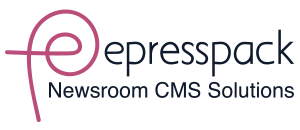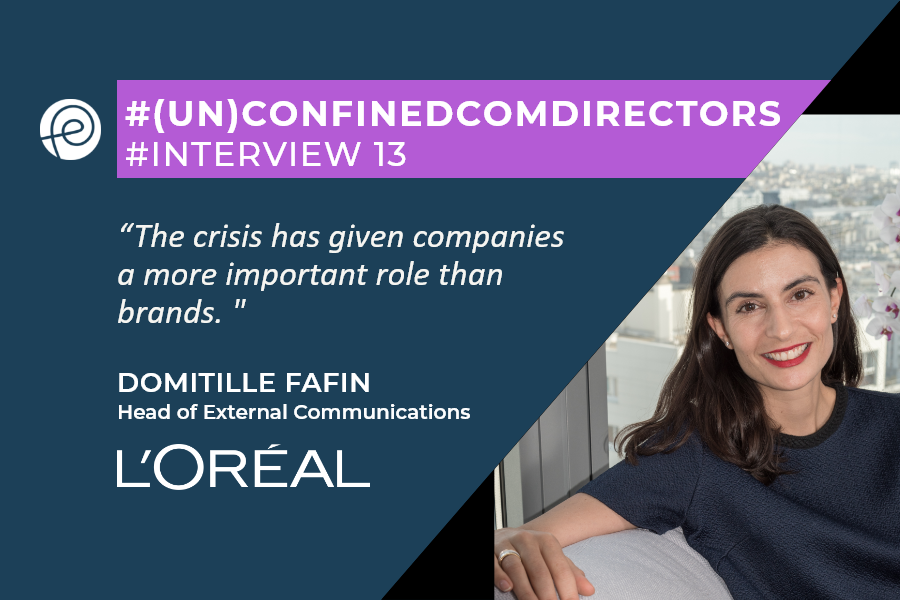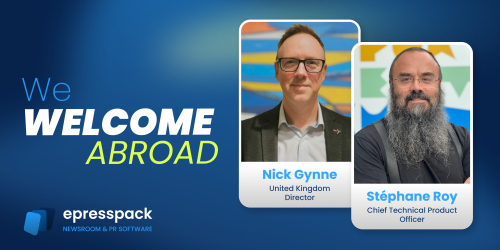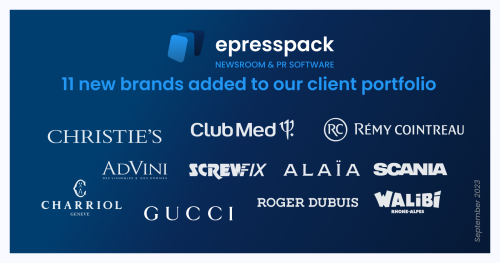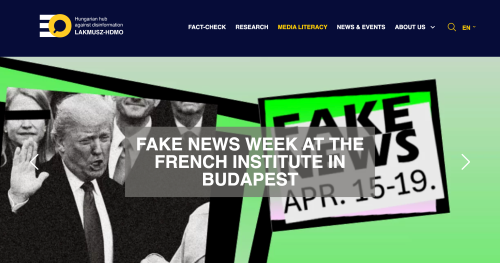The #(UN)CONFINEDCOMDIRECTORS series continues. Because the health crisis puts the communication sector in an uncertain context, Epresspack talks to the communication and marketing professionals that it supports daily in France and Europe. This week, Domitille Fafin, Head of External Communications for the L’Oréal group
1- You say that the crisis gives even more importance to corporate communication. Could you explain more?
I do indeed find that the crisis has given companies a more important role. These are the groups that have spoken to help in the front lines, much more than the brands. We all felt this strong expectation on the part of citizens of companies and their leaders as to how they would contribute to the collective effort. Today, even though we are no longer in the heart of the crisis, the complex and uncertain period means that this is still the case. At L’Oréal, for example, we have made a commitment to maintaining the recruitment of interns and apprentices at the same level; a decision that was made at the group level, at the "corporate" level and which has spread throughout the organization.
I think the two will always coexist. For a group like ours, there will always be the corporate brand and commercial brands. But it is true that we are witnessing a real porosity between them and that's good! Because to be strong and impactful, corporate discourse must be nourished by evidence and it is the brands that implement them. Conversely, brands tend more and more to develop a real corporate discourse, mirroring a real desire to show their commitments.
Today everyone in the company must, in my opinion, feel responsible for the reputation of the group and have a role to play in contributing positively to it. I have been working for 15 years, matrices evolve over time and I doubt there is an ideal matrix. The important thing is that the strategic choices are communicated throughout the organization and that everyone is involved in the business plan.
I haven't been in the job for 110 years ... but what is certain is that consumers today expect businesses as much as products, meaning as well as services. And the crisis has only accelerated the phenomenon. With us, it is this core of values that unites all of our 36 international brands. Jean-Paul Agon often says that non-economic performance goes hand in hand with economic performance, which feeds into a virtuous circle. Based on this vision, L’Oréal, for example, made a strong and early commitment to sustainable development with a 2030 program, which particularly concerns water, carbon emissions, and deforestation. We are also the only company in the world to have obtained a triple AAA four years in a row in the international benchmark ranking, the CDP. Among the other subjects that are close to our hearts and on which we act, there is diversity, inclusion and in particular gender equality which is a very significant subject for us, as are questions of ethics.
We have indeed embarked on a major solidarity plan to support our ecosystem, for example by modifying our production chains to produce hydro-alcoholic gel for hospital staff and mass distribution, but also by providing financial support to our customers and partners. In terms of engagement, it had an incredible impact! First of all, it created an immense sense of pride among our employees, who in my opinion - even without being in charge of internal communication - constitute the first and most demanding audience in the company. The benefits were also tangible in job interviews. The candidates spoke about it spontaneously having clearly perceived and appreciated this facet of the group which they did not know. Likewise, I hear from all sides that it has incredibly strengthened the bonds with our customers and partners - hairdressers for example - and created very deep loyalty. When I hear employees, HR, and business entities giving us such feedback, I don't need post-tests to be convinced that the benefits for the group brand have been great.
Rather, we adapted to exceptional circumstances. The impact and audience of social media have prompted us to make greater use of the group's corporate storefronts to speak to a more diverse audience than before. But the crisis has also confirmed the importance of the traditional quality press with its reliable and verified information.
I come from the world of oil where the crisis comm is frequent and sometimes even more sensitive. What I do know is that there is never a ready-made answer. First, because the circumstances are different each time and also because society is constantly changing. In fact, the answer from 5 years ago is no longer the correct one. The only thing that does not change is the need to anticipate and learn. Doing simulations, training ... it saves precious time in dealing with crises that by definition always happen in the evening, on weekends, or during holidays!
Traditionally, the group is known for its performance, its excellence as a Marketing training school, or its great stability. For my part, I discovered strong convictions, for example on SD, gender equality, or the well-being of employees. Paternity leave has also been extended with us long before the law! When you lift the hood, the group has some incredible actions. My goal is for L’Oréal to be recognized as much for its soft skills as for its hard skills.
For me this is obvious and I tend to be wary of people who are suspicious of innovation. Innovation can be technological but also societal, environmental ... It is multi-faceted. I was recently talking to researchers who were asked to develop a product based on just 3 ingredients. They were delighted because this new constraint allowed them, according to them, to innovate in an interesting direction. Innovation is imperative and it is the responsibility of the company to ensure that it takes us forward. This is why each new product must have a better environmental and social record with us than the previous one.



